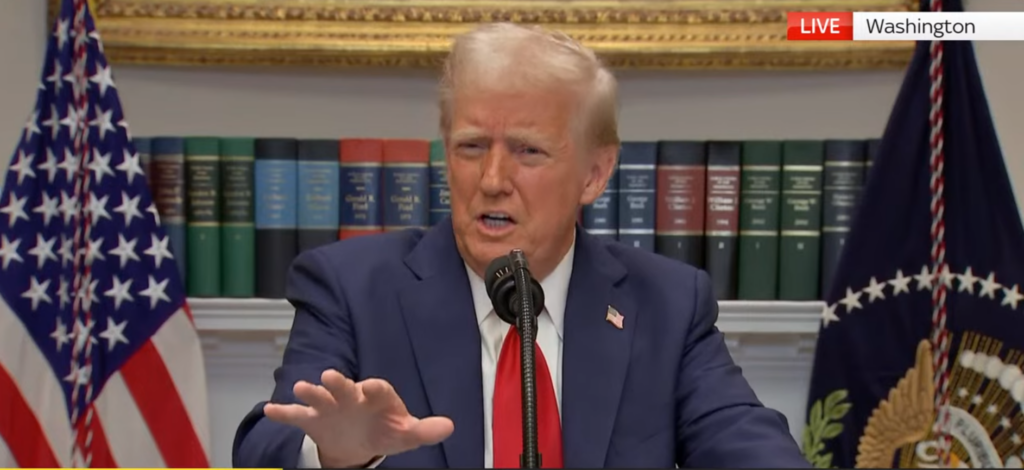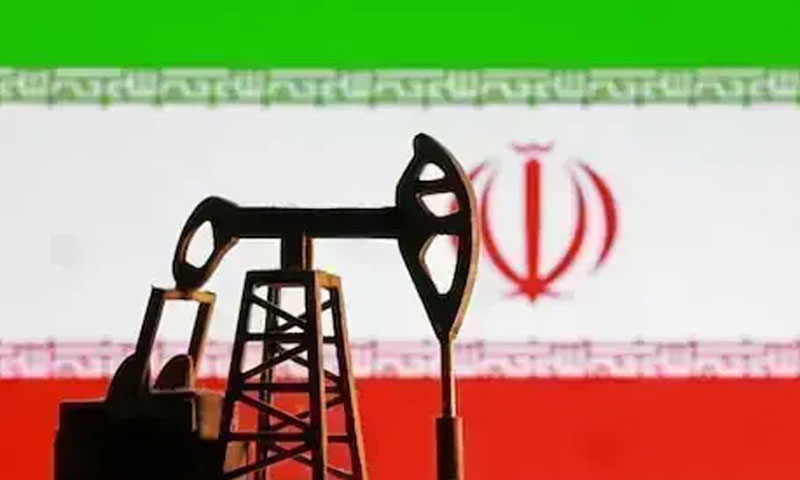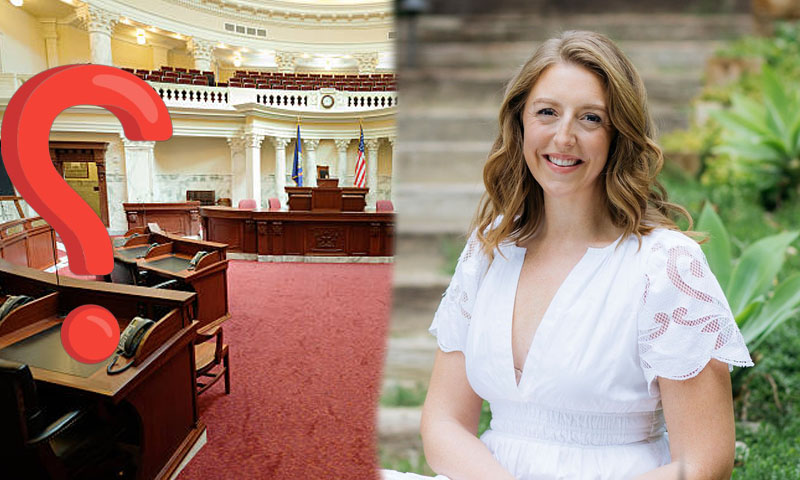- Web
- Today
Trump’s first press conference hints a more prepared second term
-

- Maham Khan
- Jan 22, 2025

In his first press conference since assuming the United States presidency for the second term, Donald Trump demonstrated a remarkably different approach compared to the rather hostile relationship with the media during his first term.
A series of blunders and contentious exchanges with the media characterised Trump’s interaction with the media during his first tenure as president. His responses were often defensive, and he struggled to articulate clear policies, leading to widespread criticism. He also wasn’t prepared enough to answer pointed questions by journalists, frequently exhibiting anger when criticised.
Read more: Saudi FM’s statements reflect shifting policies towards Israel
In contrast, Trump’s recent press conference showcased a more polished and prepared leader. He appeared to have anticipated the journalists’ questions, providing structured responses that reflected a prepared approach to how he would resolve a specific issue or policy he had previously highlighted.
One notable aspect of Trump’s recent address was his focus on the challenges faced by California, particularly in the aftermath of the devastating Los Angeles (LA) wildfires. By highlighting the Democratic-run state’s water mismanagement, Trump effectively targeted his rivals on an issue they would have difficulty negating.
He pointed out that thousands of acres of water were wasted each month, “flushed into the Pacific”, because of bureaucratic hurdles. Trump claimed that the current policy, which limits water usage to a specific amount per unit/owner, had led to substantial wastage that could have been stored and used to fight the fires in LA. The California government will now struggle to refute such a huge incompetence charge levelled against it.

The Republican’s assertion that he would have issued an order regarding the availability of water in California reflects how he intends to position himself as a decisive ‘deal-maker’, who directly and quickly addresses pressing concerns, and will be able to overcome ‘bureaucratic hellhole’, an issue which clogs up pressing issues for months to years. This also contrasts sharply with his earlier tenure, where he often deflected criticism rather than detailing specifically what course of action he would pursue.
While Trump did exhibit a confrontational demeanour throughout the press conference, labeling some journalists’ questions as “garbage”, it also signals a calculated strategy to reinforce his base’s perception of him as a fighter against perceived mainstream media’s bias.

An important part of the press conference was Trump’s announcement of a $500 billion investment in an artificial intelligence (AI) project with SoftBank and Oracle, which he claimed would create 100,000 jobs. Such an ambitious initiative backed by major US companies (not foreign) taps into Trump’s background as a private sector businessman and his promise to “bring back jobs” to the US.
Even though he is not bringing back jobs-rather creating more-it already wins over an average viewer, who may not be well-versed in intricacies of businesses or providing subsidies to the private sector. The companies who are part of the project are also US-based, fulfilling another aspect of his campaign promise.
The reality media mogul mentioned that the establishment of a new company, Stargate, with an initial investment of $100 billion also marks a commitment to technological advancement at a time where China is feared in soon overtaking the US in fields of AI and technology. The fears were first encountered during his previous presidency when he accused China of stealing US technology and imposed sanctions on the Asian tiger. China winning the 5G technology ‘race’ further cemented these concerns.
The billionaire’s remarks regarding immigration policy, particularly the H-1 visa programme, further illustrate him carefully addressing issues he constantly and repeatedly raised in his campaign. Trump has long criticised and lambasted illegal immigration into the United States, claiming undocumented workers were ‘stealing’ jobs from the locals. By highlighting that only ‘the best people” would be allowed to come to the US, he is appealing to both, business interests and his voter base concerned about immigration. This is a departure from his earlier methods.
The press conference also touched on foreign policy, with Trump repeating his stance on Russia and Ukraine. Where before he was known to backtrack on his earlier words, give remarks in direct contradiction to established US policy or just ‘spew’ whatever “came to his mind”, his insistence on imposing more sanctions if Russia does not engage in negotiations showcases two things, continued US opposition and sanctioning of Russia because of the war, and not contradicting his earlier stance.
While Trump did mention enjoying good relations with Putin, he was very clear in seeking an end to the war, as promised during his election campaign. He quite strongly demanded Russia come to the negotiation table, and if it refused, threatened further sanctions.
His call for the European Union to increase aid to Ukraine and NATO’s defense budget by 5 per cent per member-state, is also in line with his earlier statements, and does not contradict his previous stance. Trump blasted European countries for only contributing 2 per cent of their GDP to NATO, and demanded it be raised to 5 per cent, leaving no room for negotiations, echoing his ‘America First’ policy.
The US president’s comments regarding pardoning people involved in the January 6 Capitol riots reveals a continued commitment to his base. His opponents have long criticised his silence while his supporters were being sentenced for their participation in the riots during Democrat Biden’s presidency. Trump’s silence and not even a single word in support of the Capitol Hill rioters was seen by many as abandonment of his allies.
However, during the press conference, he framed the pardons as a response to the suffering of his allies, maintaining his narrative that the 2020 elections were rigged. The insistence on 2020 election rigging remains a cornerstone of his political identity and may galvanise further support among the right-wing leaning US populace.

The Democratic Party faces significant challenges in the wake of Trump’s press conference. Whatever solace they may have derived from Trump’s unpredictability, unpreparedness, and nigh-on daily blunders he committed during 2017-2021 presidency, the press conference should serve as a wake-up call.
The blue party’s handling of the 2024 elections itself was disastrous. Biden was forced to step down after a “catastrophic” presidential debate, where his mental faculties were seriously questioned. The next candidate, Kamala Harris, had very limited time (less than 3 months) to mount a strong campaign.
The Democrats’ inability to unite and effectively counter Trump shows how the party needs to change strategies. Addressing key voter concerns, particularly regarding the Israel-Palestine issue and selecting a candidate with substantial media exposure will be critical for the party’s success in the next election.
The Democratic Party must also reconsider its approach to minority voters, as evidenced by the significant support Trump received from different demographics. Majority of Latino voters in several Texas counties chose Trump, Harris lost Muslim voter base in Missouri over vague polices on Israel’s siege of Gaza, and a large portion of Indian Americans agree with Trump on his pro-business polices (Indian Americans form the richest ethnic group in the United States).
Read more: 22 states challenge Trump’s executive order cutting birthright citizenship
The perception that minorities will consistently vote Democratic may no longer hold true. This necessitates a reevaluation of their current outreach strategies and whats policies are they prioritising.
Trump’s first press conference of his second term marks a huge departure from his initial foray into assuming command of the world’s most powerful country. His ‘preparedness;, strategic responses, and confrontational style should serve as a warning for the Democratic Party as it grapples with its internal challenges, shifting dynamics of traditional voter base, and rethinking candidates’ criteria.




